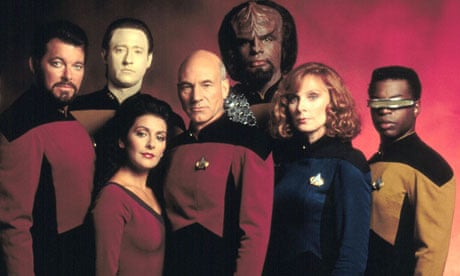It was a show that few predicted would last one season, let alone seven. Trying to recapture the glory of a long cancelled sci-fi series from the 60s seemed like hubris; replacing William Shatner's virile Captain Kirk with balding, 47-year-old Yorkshireman Patrick Stewart, described by the LA Times as an "unknown British Shakespearean actor" appeared sheer insanity. But, after a few shaky seasons of variable quality, it worked, equalling the bottled lightning of the original and in many ways surpassing it.
Managing a constant average of around 20 million viewers in the US alone for its entire run, Star Trek: The Next Generation presented a captivating, seductively optimistic vision of a human future where disease, poverty and national borders were things of the past. Unlike Kirk's crew, the problems Picard and his cohorts faced were ones they couldn't just punch, phaser or kiss their way out of. This was a less violent, more cerebral show, with a cast of rare chemistry and ability – all were theatrically trained. Over the years, they all got a chance to shine, with Brent Spiner as Data the super-intelligent android who had aspirations of humanity, and Michael Dorn as the Klingon Lieutenant Worf, constantly battling his aggressive instincts, both standing out. Each combined the otherworldly with the recognisably human, but never made the viewer doubt they were watching a robot and an alien.
Next Generation managed a decent average of about one episode in four being great television – almost anyone would appreciate the smart, original storytelling. Anything with the coldly confrontational cybernetic race the Borg was great value, as were adventures featuring the near-omnipotent troublemaker Q. Outer space provided the show with incredible scope: from courtroom dramas such as The Measure of a Man, in which Data must prove he can be classed as a lifeform, to the harrowing Chain Of Command, where Picard is captured on a clandestine mission and subjected to a brutal and relentless interrogation, and the time-twisting Yesterday's Enterprise, where the crew collides with an alternate and more militaristic alternate universe in which a decades long war with the Klingons is being waged.
So far, only the first two seasons have been completed in a difficult and complex restoration programme. But Next Generation, arguably the most successful and recognisable of all the many offshoots of the Trek franchise, deserves the special treatment. Really, there's never been a better time to watch this great, classic television show, and that's a scientific fact.



Comments (…)
Sign in or create your Guardian account to join the discussion